Build Cloud Real Estate Application with Ascendix
We help companies automate their workflow by developing bespoke software cloud solutions and cloud migration apps.
The real estate industry used to be old-fashioned and devoid of technology and software integration. Now, these times are gone. Disruptive real estate technology has been actively adopting modern innovations that revolutionize the industry.
Some notable real estate technology trends include Artificial Intelligence (AI), Big Data, Virtual Reality (VR), Internet of Things (IoT), automated property management and maintenance, and many others. They introduce a completely new approach to real estate case management.
These real estate technology trends bring an array of opportunities for real estate agents and customers alike. Practical real estate technology and innovation applications include
These advancements are not only improving efficiency but also shaping the future of real estate technology. And those who don’t catch up with incredibly dynamic real estate innovations, unfortunately, risk being left behind.
As a seasoned real estate tech expert with a 16-year-long history in the industry, we have been at the forefront of real estate innovation and are here to share our predictions on the real estate technology trends that are going to stay with us in the years ahead.
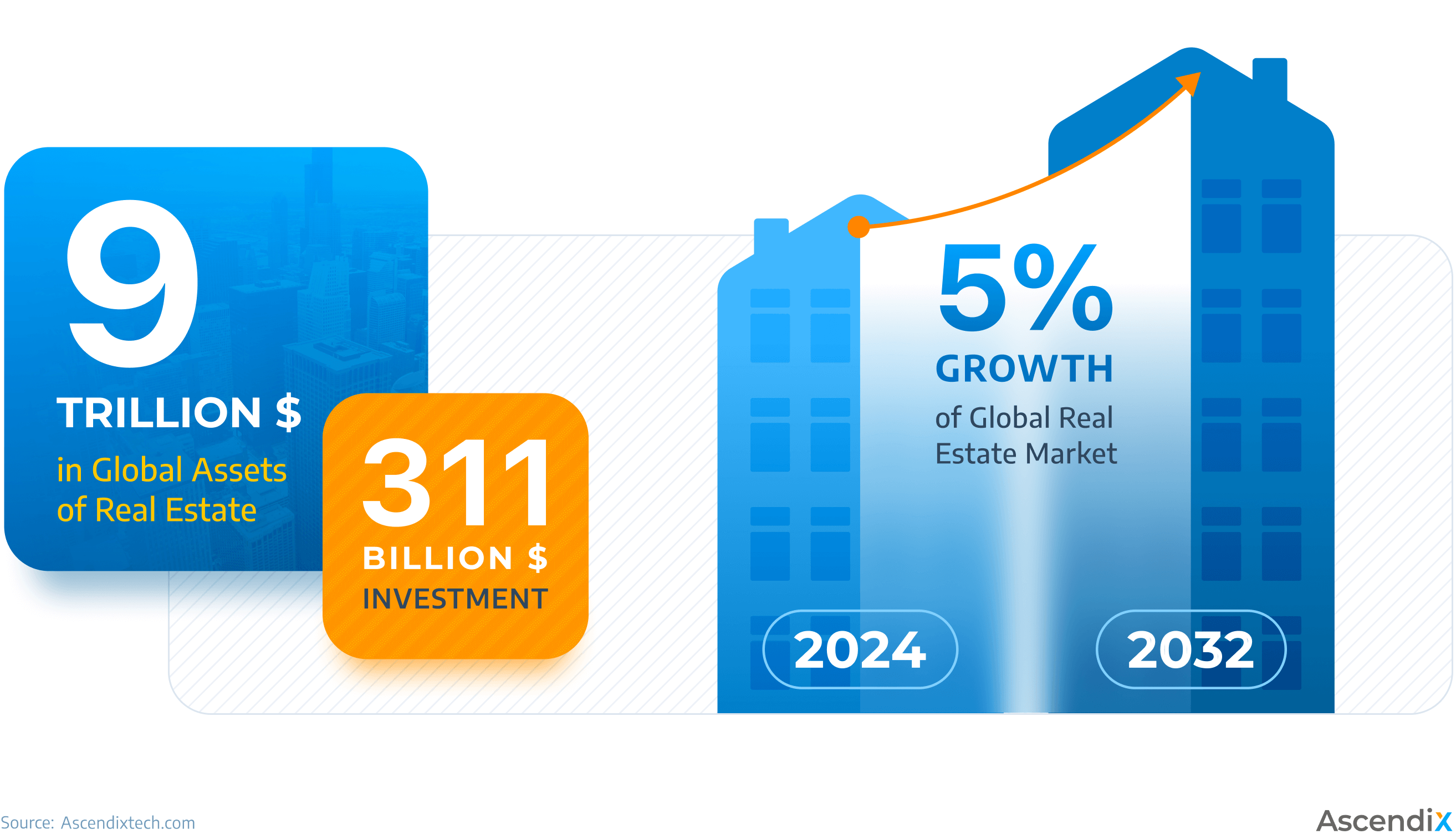
With almost USD 9 trillion in global assets, commercial real estate is the largest industry in the world. Add to that the residential real estate market, which has much greater value, and you are talking about the world’s biggest asset class that over the years created much wealth and investment opportunities. In 2018, investment in real estate peaked at €311 billion, according to CBRE.
According to Expert Market Research, the global real estate market size is expected to grow at a CAGR of 5.00% between 2024 and 2032, owing to the expanding population, and the growing demand for high-quality housing and infrastructure (source). In the US alone, real estate takes up around 13% of the country’s annual GDP and is the fastest-growing sector of the economy (source).
Real estate technology refers to proptech software, tools, apps, and other kinds of technology for real estate agents, customers, architects, and property managers that improve efficiency and facilitate real estate activities, from buying, selling, renting (Rightmove & Airbnb), and managing to marketing and investing (OpenSignal).
Real estate processes can highly benefit from technological advancements application. Real estate and technology became indivisible, bringing innovation in real estate to a new level. Virtual reality, AI-powered real estate technology tools, and Internet of Things are real estate innovations that improve the efficiency and accessibility of real estate transactions, streamline operations, and automate manual and repetitive work.
AI innovation in real estate reduces manual workload, optimizes property analysis, automates routine tasks, such as document processing, appointment scheduling, and data management, which saves time and resources for employees.
The digital revolution will continue to reshape the real estate landscape in 2024. Along with the widespread adoption of real estate software, some of the best real estate technology trends in 2024 will include AI, Machine Learning, Cloud Computing, Big Data Analytics, Virtual and Augmented Reality, Smart Buildings, IoT, Green Building Technology, Predictive Analytics, and many others.
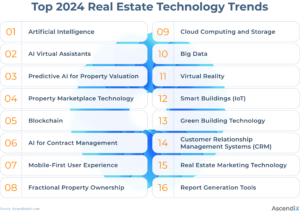
Probably the biggest real estate technology and innovation breakthrough is Artificial Intelligence, or AI, which has been on the rise since 2022 and will stay here for long. This real estate tech trend has reached the industry quite recently, but already became essential in real estate operations.
The trend of AI in real estate will further evolve with the recent introduction of the GPT Store, allowing users to choose ready-made chatbots from the constantly expanding GPT collection.
With the emergence of a whole new collection of affordable AI-powered real estate assistance, many more repetitive and manual tasks will be optimized, automated, and replaced by technology, saving time and effort of real estate professionals.
Some of the most popular AI applications in real estate are:
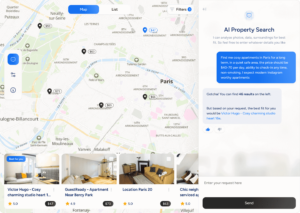
AI Property Search | Ascendix
Real estate agents must handle a huge variety of tasks – from dealing with clients to documentation management. Luckily, in 2024 AI real estate innovation can help by implementing virtual assistants, AI chatbots, and automated management to streamline tedious real estate processes.
AI assistants improve customer service, streamline communication processes, automate rent collection and maintenance scheduling, and provide round-the-clock connectivity. AI technology is revolutionizing operations, enhancing productivity, improving client satisfaction, and increasing management efficiency. With 2024 real estate technology trends like AI virtual assistants and chatbots, the processes in real estate become efficient and effective.
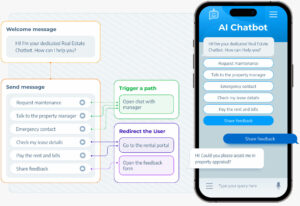
AI Virtual Assistant for Property Management | Ascendix
Real estate technology, integrated with AI, can be used by real estate professionals to make market predictions and automate data analysis. Predictive AI can be used for automating property valuation, predicting relevant rent, and analyzing required real estate data.
This real estate technology utilizes AI and ML to analyze available historical data, market trends, and property attributes to accurately predict property values and rental rates. Therefore, predictive AI analytics provides valuable information for strategic planning and portfolio management, which will ultimately lead to maintaining competitive advantage in the market.

AI Property Valuation | Ascendix
Property marketplace real estate technology will play a crucial role in the real estate industry in 2024. Currently, rental marketplaces act as an intermediary between buyers looking for a property and sellers or landlords. Marketplaces make the home-searching process fast, easy, convenient, and effective.
This real estate tech trend reflects a shift towards the sharing economy, with global online marketplace sales expected to reach $8.1 trillion by 2024. This indicates a permanent change in how real estate transactions are conducted, with a growing trust in online marketplaces.
Having disappeared for some time, the blockchain tech trend is back on track in 2024. Blockchain is one of the major real estate technology trends, offering transparency, security, and efficiency in transactions and record-keeping.
Blockchain technology is used to create tamper-proof digital ledgers, streamlining property transfers and lease agreements by reducing reliance on banks and lawyers. This way, blockchain real estate technology makes property transactions and management independent from the government and financial institutions, fully digitalized, and highly secure. Moreover, blockchain’s smart contracts automate contract execution, enhancing transaction efficiency and trust even more.
It is suggested that blockchain will become a significant real estate tech trend, finding its practical utilization in tokenization for broader investment participation and smart contracting using cryptocurrencies.
AI has already optimized multiple real estate processes, and as document management is one of the most tedious ones, it was not left aside. AI contract lifecycle management tools, such as AI lease abstraction and AI data entry have emerged as a transformative real estate technology trend in the industry.
Just like other real estate tech trends, AI contract management uses artificial intelligence to automate the extraction of crucial information from various data sources, like leases, agreements, and emails, and then enter the essential details into the CRM.
AI significantly enhances efficiency and accuracy, reducing manual errors and saving time, which is why this real estate innovation is one of the most often utilized among real estate professionals. This approach not only optimizes lease management tasks but also enables operational performance improvement through analytical capabilities of AI real estate innovations.
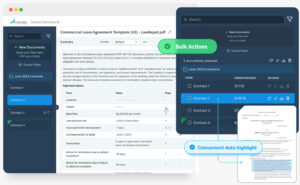
Contract Summary AI | Ascendix
As the customers massively switch to mobile experiences, the real estate industry does not stand aside. The real estate technology trend of mobile-first experiences is driven by the growing reliance on mobile devices for property search, transaction management, and AI assistance.
Real estate platforms and apps prioritize responsive design, intuitive navigation, and integration with mobile features like GPS and augmented reality. This real estate tech trend responds to changing consumer behavior, where users demand instant access to property information and communication with agents via mobile devices.
The emphasis on mobile-first enhances user convenience, therefore making decision-making and property transactions faster and easier for both customer and agent. This real estate technology trend emphasizes the importance of considering the target audience and choosing between a website and an app to meet user preferences effectively.
Fractional property ownership is a collaborative ownership model where multiple parties share property ownership, dividing both usage and responsibilities based on proportional shares. This method is widely used in luxury and vacation real estate, as using it, access to expensive properties becomes easier. Fractional ownership is primarily used by real estate investors, as it helps diversify portfolios and access exclusive real estate opportunities.
In 2024, crowdfunding and fractional property ownership have surged as real estate innovations due to increased accessibility, enabling individuals to invest with smaller capital. Other benefits of fractional property ownership include the possibility of portfolio diversification, a chance to spread risks, real estate technology advancements used in investment processes, and high-income potential from rental returns or project investments. Therefore, fractional property ownership is one of the real estate trends that is here to stay, at least for 2024.
According to Deloitte’s research, migrating to the cloud is one of the top real estate technology trends implemented by 36% of real estate respondents across the globe.
The whole idea behind the cloud is to let companies store their data, say client or property details, online without having to manage onsite data centers or organize paperwork. This means you no longer need to worry about data security and accessibility, system maintenance, and room for document storage.
For real estate agents / dealers / brokers migration to the cloud mainly comes in the form of subscription-based applications like property management platforms, transportation management software, or simply cloud data storage.
And although cloud computing has been around for at least a decade, widely adopted in other industries (just think of fintech), it took it a while to find its way into real estate, which so far has been known as an offline first industry. Among the most important benefits of cloud computing for real estate are:
As all data resides in the cloud, real estate professionals can access information from anywhere. That makes them more productive, collaborative, and satisfied in their jobs.
Depending on how fast your real estate business grows, cloud-based platforms can scale up or down respectively. You don’t need to set up anything from scratch – just choose a more suitable subscription plan.
Since all the data resides in the cloud away from your often unsecured network at home or work or worse than that on paper files on your desk, you can rest assured that no system breaches will happen.
Operation in the cloud enables real estate firms to cut down the use of paper, thus ensuring more control over documents, better data security, and instant backups.
We help companies automate their workflow by developing bespoke software cloud solutions and cloud migration apps.
If just a decade ago, real estate firms made decisions based on professional experience and records in Excel, today data-related real estate tech trends have changed significantly. Artificial intelligence complemented by big data makes it possible to paint more vivid pictures of future risks and opportunities in the real estate market, leading to a higher quality of analysis and predictions.
By harnessing big data, like extensive datasets from property listings, market trends, and demographic information, real estate tech tools can give a comprehensive understanding of the market landscape.
Big data technology is becoming even more powerful when combined with artificial intelligence. The applications of big data integrated with AI in real estate include multiple examples:
Among other real estate innovations, Virtual Reality (VR) technology plays a transformative role by providing immersive and interactive experiences for buyers, sellers, and agents. This real estate technology trend allows potential buyers to take virtual tours of properties from their homes, experiencing the look and feel of houses without visiting them.
Real estate developers utilize VR to showcase architectural plans and designs, helping clients visualize projects before they are constructed. Agents use such real estate technology to conduct virtual property viewings, enabling clients to explore every detail of a home before renting or buying it.
Moreover, VR can be employed during the planning and design phase of construction projects, helping the professionals involved to collaborate and make more informed decisions. This real estate technology trend is unique, as it both enhances the overall property viewing experience and contributes to more tangible understanding and vision of the property.
Modern people are living a fast-paced life, so our houses and apartments should adapt. The dynamic expectations of tenants and buyers are met with always-connected IoT homes of mart mirrors, robot vacuum cleaners, and wireless kitchen appliances interacting with each other and quickly reacting to people’s needs.
The concept of smart buildings powered by the Internet of Things appeared among real estate technology trends back in the early 2000s. However, today the power of smart homes is much more widespread and affordable, so it has become a more viable real estate technology for consumers.
There are three defining features of this real estate tech trend:
With the increased demand for digital systems to track and improve energy use, manufacturers and installers increasingly adopt efficiency-enhancing building materials and systems. One way to do this is to install low-carbon heating and cooling systems, such as heat pumps and energy-efficient A/C.
If wisely paired with the above-mentioned real estate technology trend of smart homes, green buildings can significantly decrease the carbon footprint of construction projects.
And the first enthusiasts who embrace green engineering and performance-management tools that support retrofitting are likely to see big gains.
See how AscendixTech can help you close more deals and improve your prospecting.
As the role of real estate technology and innovation scales up, it becomes even more important for real estate agents to keep up with the change. New real estate technology trends for brokers most often include AI-powered customer relationship management systems, real estate marketing automation technology, and report generation tools.
In fact, these real estate tech trends strive at the intersection of all other above-mentioned real estate innovations, like AI, cloud computing, and data analytics.
Obviously, transitioning from traditional (or old-fashioned) spreadsheets and paper notebooks to AI automation and digital tools might be uncomfortable and painful. Nevertheless, mastering the cutting-edge real estate technology trends is nearly a requirement in today’s atmosphere, as this means maintaining a competitive advantage and staying ahead in the industry.
Here are two of the key reasons why real estate innovation is crucial for real estate agents:
Your data is the lifeblood of your CRM system, and the CRM system makes sure you’re using your data to the fullest.
A customer Relationship Management System, or CRM for short, is an all-in-one platform for managing/tracking a company’s relationships and interactions with existing and potential customers. It aggregates all aspects of business and makes the collaboration between sales, marketing, and administration easier than ever before.
There is generic CRM software like Sugar CRM, Salesforce, and MS Dynamics, which works fine for most industries but does not always match highly specific business needs like those in real estate. On the other hand, there are specialized CRM platforms tailored to real estate processes – AscendixRE, Buildout CRM, or RealNex.
Common functionality of real estate CRM systems includes:
As the world has globally switched to online mode, word of mouth or direct mail is no longer enough to win prospective clients. Today, having an online presence is crucial.
To strengthen the brand and client experience, real estate agents more and more often opt for marketing realtor technology, like listing portals that let you publish and update your listings right from your CRM (MarketSpace) or automated marketing campaign tools to send personalized journeys to clients (additional service in RealNex and Buildout).
On the whole, marketing realtor technology is commonly associated with the following functionality:
Ascendix MarketSpace goes beyond this. Apart from the basic features listed above, the platform includes collaborative project workspaces, a document signing program, and secure deal rooms, all within one core solution AscendixRE CRM (Unlimited plan only for $129/mo).
Brochure generation still has its place under the sun, but a bit in a different form: clients more and more often request marketing collateral online. And if every real estate agent can generate more or less decent collateral in amateur tools like Canva or Photoshop, the key differentiator here is how quickly they can do it.
With marketing automation software like Ascendix Composer or Buildout, on the other hand, you’ll be able to generate digestible, meaningful, and professional documents in a matter of 5 clicks as all property data, photos, and client records will be pulled out from your CRM system or another database, so you won’t need to fill in all fields manually.
The beauty of Ascendix Composer is that, unlike Buildout or other solutions, you do not need to invest in yet another stand-alone solution, as Composer is already included in your subscription.
Real estate technology trends, like AI and IoT, are now actively reshaping real estate, driving a significant change in the industry. Therefore, real estate technology startups which use AI, IoT, and big data innovations are likely to receive the most funding. Commercial lending and financial platforms will also offer a ripe prospect for tech real estate startups.
AI lease abstraction, valuation tools, investment prediction and management tools, automated property management platforms, and AI-powered chatbots and property search are the biggest real estate tech trends, which transform the real estate industry and are likely to get most of attention and funding in the upcoming years.
Despite initial concerns about the threat of artificial intelligence, the rise of AI and other real estate technologies and innovations hasn’t led to a surge of jobs being replaced by machines, and neither is it likely to in the foreseeable future.
While current real estate technology trends significantly improve real estate operations and will definitely continue to help us derive greater value from client interactions, it can never replace the nuanced regional knowledge and skill in negotiating in a very emotional environment, which so far has been a luxury only available to humans.
Both sellers and buyers can be very emotional during a transaction, which by far is one of the most important milestones in most people’s lives, and I can barely imagine sending clients to a chatbot-type app asking them to “press five” to reach a representative in some far-flung office.
So, until real estate technology can behave “emotionally,” it is very unlikely that real estate agents will be replaced by some realtor technology in the near future.
With our immense real estate expertise, Ascendix stands at the forefront of real estate technology development, effectively harnessing the power of artificial intelligence. Ascendix’s innovative solutions utilize AI to streamline various processes in real estate, such as lease abstraction, property search, or automated customer support. Let’s discover Ascendix’s commitment to technological excellence in more detail:

Lease Abstraction AI Tool | Ascendix
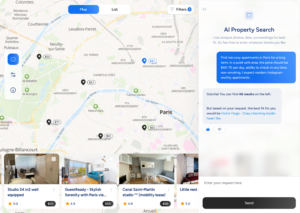
AI Property Search App | Ascendix
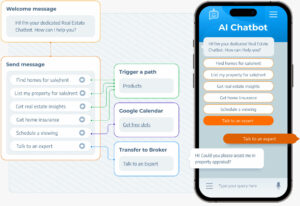
Real Estate AI Chatbot | Ascendix
These examples of utilizing AI for real estate showcase Ascendix expertise and experience in developing the software, which is best tailored to the needs of agents, brokers, customers, and other real estate players. If you want to implement AI in your business, Ascendix is a reliable and seasoned partner.
With the dynamic evolution of real estate trends at the intersection of real estate technology and innovation in software, it has never been a more important time to be proactive in adopting disruptive technologies like AI, Big Data, or Virtual Reality.
If you are ready to embrace real estate innovation but don’t have internal resources to involve in the development process of your Proptech product, consider hiring Ascendix – a seasoned proptech development firm with 16 years in real estate and professional services. Here is why our clients choose us:
Tell us more about your technology challenges and we’ll make sure you address them with smart proptech solutions that will pay dividends for years to come.
Check out the overview of the proptech consulting and software development projects we delivered to our clients.
Technology is transforming the real estate landscape by digitalizing and automating traditional industry practices. The rise of artificial intelligence has altered the way properties are appraised, listed, searched, and marketed, providing a more convenient experience for buyers and sellers. Virtual reality technology enables virtual property tours, allowing potential buyers to explore homes remotely. Big data analytics enhances market insights, enabling better pricing strategies and investment decisions.
It’s hard to point out a single real estate innovation bound to transform the industry. Real estate technology trends like artificial intelligence, virtual reality, and big data analytics are definitely going to reshape the industry, enhancing customer experience and streamlining operations. Sustainability and eco-friendly practices are also becoming important, with a rising demand for environmental awareness. Additionally, the incorporation of Internet of Things (IoT) technology has emerged, contributing to smart and efficient urban living. Ultimately, the next big thing in real estate is likely to be a combination of technological innovation, sustainability, and a focus on incorporating real estate technology in daily life.
The real estate industry is undergoing a transformative shift with the integration of innovative technologies. Artificial Intelligence is revolutionizing real estate processes, aiding in predictive analytics, streamlining business operations, effective customer service, and quick lease abstraction. Virtual Reality is used for immersive virtual tours, providing potential buyers with detailed views of properties. Big Data Analytics is utilized for gathering and analyzing vast datasets, offering valuable insights into market trends and investment opportunities. Internet of Things (IoT) devices contribute to smart home implementation, enhancing security and sustainability. These real estate technologies are fostering efficiency, innovation, and improved experiences for real estate customers, investors, agents, and other professionals.
Alina is a proptech technology expert and a storyteller at Ascendix, investigating the real estate market and sharing her insights and tips with up-and-coming proptech startups, established real estate agencies, and industry stakeholders. She talks about real estate technology, business automation, and industry news.